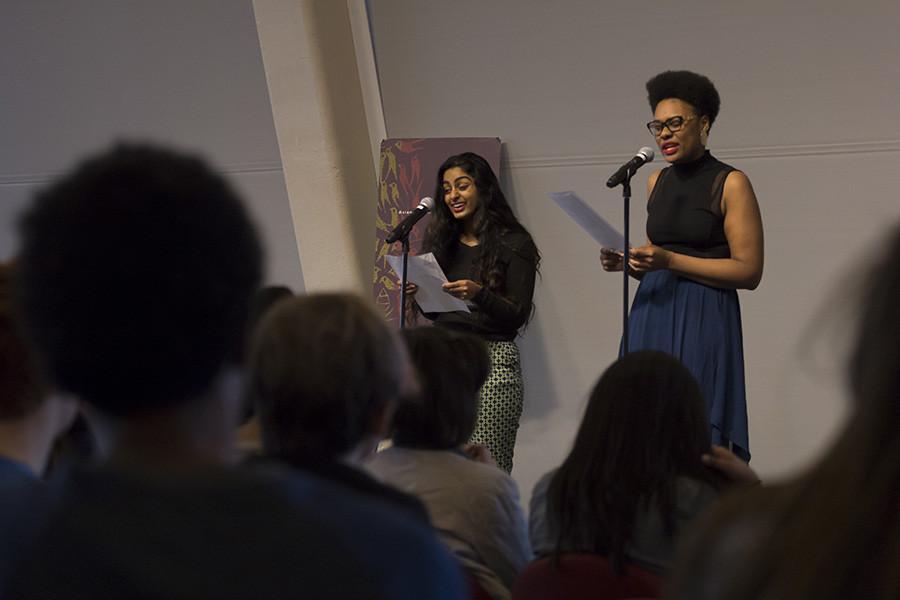Race, gender discussed through slam poetry
Ramya Ramana, left, and Crystal Valentine deliver a spoken word duet
April 16, 2015
Slam poetry has traditionally been an arena for frank discussions on social issues. Wednesday’s conversation, hosted by the Asian/Pacific/American Institute at NYU at the Kimmel Center for University Life, featured poets who performed their work and discussed the challenges faced by groups marginalized by society.
Speakers included Ramya Ramanam, an activist and the current Youth Poet Laureate of New York City; Paul Tran, a historian, activist and spoken word poet; and Crystal Valentine, a student at NYU studying creative writing and adolescent mental health studies.
Themes of the night focused on the adversity that many queer people and people of color face in everyday life. Tran said literacy can be used to raise awareness on these issues and the violence that black people face.
“Literacy, and language, has kept people like us from sitting at the table of power,” Tran said. “But as accidents of literacy, as young people dangerously armed with the ability, not only to read, but to write, rewrite, and make right our history, Ramya, Crystal and I use language to testify against the violence that this country engenders against its most vulnerable populations.”
The speakers also discussed why they began creating slam poetry explaining that it gave them a voice and forced people to listen.
“When I stand up on a stage and when I perform, I feel like all those times in my childhood when I couldn’t say anything I can finally say it in front of people that can feel it,” Ramana said. “As much as I have moved on from that stage in my life, when I go back to that area I still feel silenced. To me being able to be in a room full of people that want to hear my words, it’s like they want to hear everything I’ve been through.”
While some audience members noted the somber themes in the poems, Tran disagreed and said it is necessary for the writer to expel melancholy because it can otherwise preoccupy them.
“Sometimes we write out of hurt in order to heal,” Tran said. “Can’t we write about joy? Can’t we also write about love? Self-fulfillment, actualization, we can write about all those things. But in this world, out there, where there are things they will and will not let us say, sometimes we have to say these things first.”
Gallatin freshman Leah Miller said they enjoyed listening to the poems because they agreed with the ideas discussed.
“In almost every poem, or at least in every poet, there was at least a line that would sink into me and be like, ‘Oh yeah. That’s a really real thing that just happened,’” Miller said.
Valentine said the main reason for writing poetry was to recognize the unfortunate things in life and bridge the differences in peoples’ experiences.
“I think the biggest problem with the world is understanding each other,” Valentine said. “We have so many problems, so many confrontations, just because we don’t know how to understand each other. There’s like a disconnect in that. For me, poetry is my first language.”
A version of this article appeared in the Thursday, April 16 print edition. Email Justine Morris at [email protected].




























































































































































